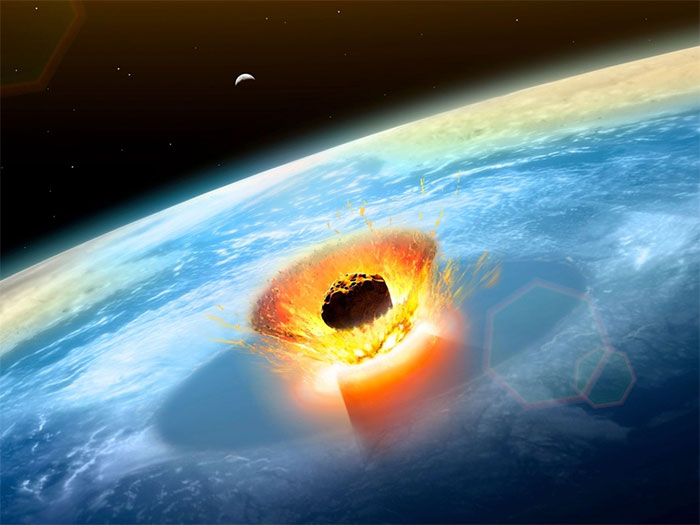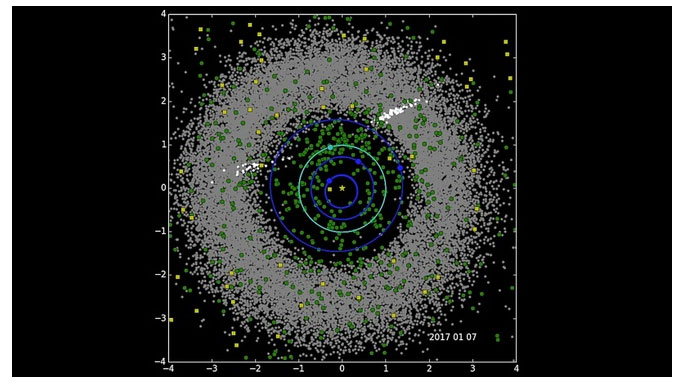When will a meteorite hit Earth again?
In 1,000 years, no asteroid larger than a kilometer will hit Earth, but there may be smaller ones .
'There won't be a major impact in the next 1,000 years, which is good news,' said Oscar Fuentes-Muñoz, an astronomer at the University of Colorado, who led a study of asteroids that are likely to come close to Earth, published in The Astronomical Journal.

No large asteroid will collide with Earth for at least the next 1,000 years. (Photo: Science Photo Library/ Alamy).
About 66 million years ago, the dinosaurs were wiped out by a 10km-wide asteroid. Not only did it wipe out most life on land in a matter of hours, the impact left behind a layer of dust that blocked sunlight, causing a winter that lasted for decades.
Fortunately, such large impacts are rare. NASA once estimated that asteroids larger than a kilometer in size, which could have caused extinctions 66 million years ago, hit Earth about once every few million years. But no one knows if the present is within that few million-year range.
The Fuentes-Muñoz team thinks the answer is no . NASA's catalog of near-Earth asteroids larger than a kilometer tall lists about 95 percent of the known objects, or nearly 1,000 asteroids. Scientists can typically track the orbits of these asteroids to predict their paths for about 100 years.

Green dots represent near-Earth objects, yellow squares represent comets, and gray dots represent all other asteroids. (Image: NASA/JPL-CALTECH/PSI).
The new study uses a different method, taking into account only the segments of asteroids' orbits that come close to Earth, rather than their entire orbits. By only taking into account a small portion of the orbit, computing power is saved to estimate longer timescales, up to 1,000 years, explains Davide Farnocchia, an astronomer at NASA's Center for Near-Earth Object Studies.
The asteroid with the highest chance of colliding with Earth is 1994 PC1 , which is about a kilometer wide and has a 0.00151% chance of crossing the Moon's orbit in the next 1,000 years. Although extremely small, that's 10 times more likely than any other asteroid. 'That's not a likely collision ,' Fuentes-Muñoz said.
However, asteroids smaller than a kilometer, which are more numerous, still pose a risk to Earth . For example, in 2013, a 20-meter-wide meteor exploded over Chelyabinsk in Russia, injuring more than 1,000 people. Small objects still cause a lot of damage.
Asteroids larger than 140 meters in diameter could destroy a city, Fuentes-Muñoz said. NASA's catalog of such asteroids is only about 40% complete. The odds of impact depend on the number of asteroids, which is still uncertain and requires further sky surveys, the expert said.
For now, though, humans can rest easy. 'There will be asteroids headed for Earth, but it's almost impossible before the year 3000,' O'Brien said.
- A giant meteorite just flew over Earth
- A meteorite as big as the Great Pyramid is about to fly over the Earth
- Meteors approaching Earth in 2026
- Giant meteorite approached the Earth at midnight on September 7
- Video: The 400 meter long meteorite is capable of crashing into the Earth
- How big a meteorite can wipe out life on Earth?
- The 50m meteorite may crash into Earth later this year
- NASA says a giant meteorite will fly over the Earth in the next 48 hours
- Meteors over 300m are flying towards Earth
- Detecting meteors with high probability of hitting the Earth
- What is Chondrit meteorite?
- 2011 AG5 meteorite can attack the earth in 2040
 Van Allen's belt and evidence that the Apollo 11 mission to the Moon was myth
Van Allen's belt and evidence that the Apollo 11 mission to the Moon was myth The levels of civilization in the universe (Kardashev scale)
The levels of civilization in the universe (Kardashev scale) Today Mars, the sun and the Earth are aligned
Today Mars, the sun and the Earth are aligned The Amazon owner announced a secret plan to build a space base for thousands of people
The Amazon owner announced a secret plan to build a space base for thousands of people